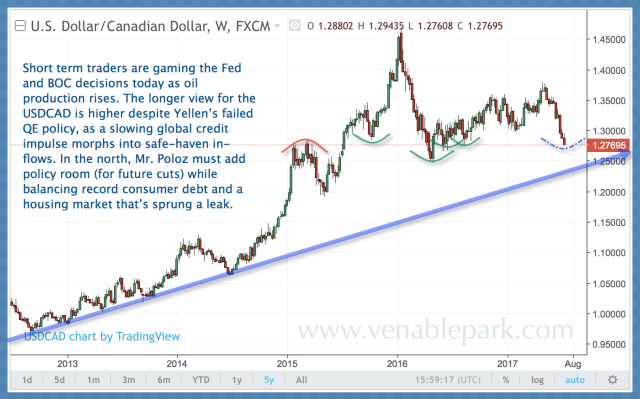The loonie is bid today on the Bank of Canada’s first rate hike in 7 years. Not a surprise, this hike was forecast by 90% of market participants surveyed in advance. Less anticipated by the consensus was US Fed Chair Yellen’s more dovish testimony today that the federal funds rate may “not have to rise all that much further to get to a neutral policy stance.” No kidding!
Nine years of recklessly low policy rates and toxic debt increases have continued to weaken financial strength and suppress the velocity of money (movement of money through the real economy), no matter how much central banks dream about ‘stimulating’ demand.At these extremes, monetary levers are powerless and even counter-productive when it comes to economic growth.
Another traditional supply/price relationship also broken:falling oil prices are not causing producers to pull back.Indeed while West Texas Crude broke below $44 a barrel this week, US production and exports soared to their highest level ever, even as OPEC and the many other non-OPEC members gun for needed cash flow by pumping more as prices fall. Canada too.
As currency traders chase after the diverging rate story in Canada (tighter) versus the US (on hold?), a bi-polar reaction is very likely to unfold. Initial trader excitement that “the BOC is raising rates!” is likely to soon become “oh no, the BOC is raising rates!” as excessively leveraged Canadian households, businesses and exporters grapple with the strain of rising debt service and falling sales/revenues/employment.

Rates must rise to restore viability to the financial system–and any hope of credibility for central banks–and yet higher rates will help prompt lower consumption, lower asset prices, an overdue economic recession, bankruptcies, write offs, larger government deficits and relative safe haven flows back to the US dollar. The North American economy, like most others, has been painted into a corner.













Leave A Comment